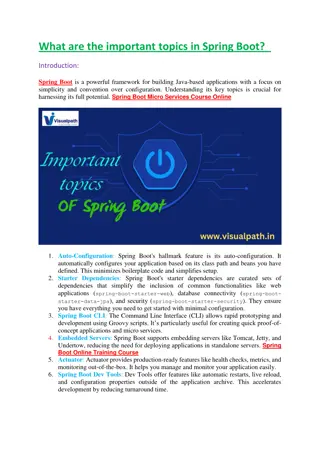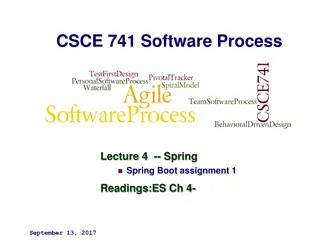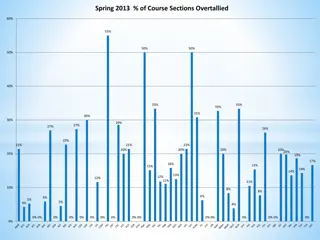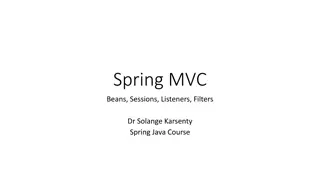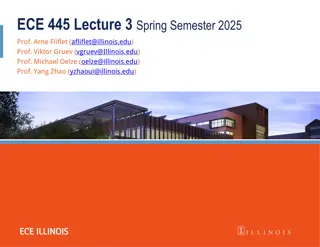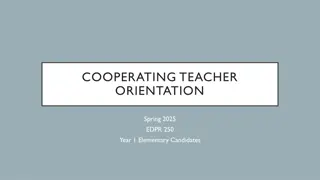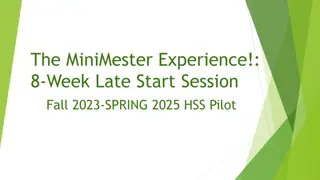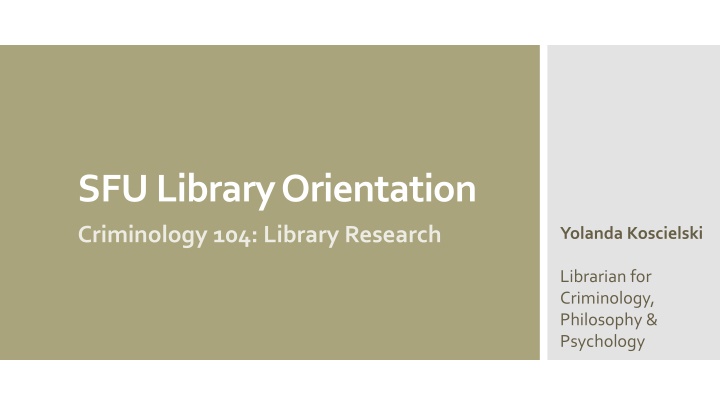
SFU Library Resources: Maximizing Research Success
Discover valuable insights on utilizing SFU Library resources effectively to enhance your research endeavors. Learn tips on accessing scholarly articles, using specialized databases, and leveraging search strategies, along with obtaining research assistance and avoiding unnecessary expenses. Explore the wealth of resources available across SFU's campuses and libraries to elevate your academic pursuits.
Download Presentation

Please find below an Image/Link to download the presentation.
The content on the website is provided AS IS for your information and personal use only. It may not be sold, licensed, or shared on other websites without obtaining consent from the author. If you encounter any issues during the download, it is possible that the publisher has removed the file from their server.
You are allowed to download the files provided on this website for personal or commercial use, subject to the condition that they are used lawfully. All files are the property of their respective owners.
The content on the website is provided AS IS for your information and personal use only. It may not be sold, licensed, or shared on other websites without obtaining consent from the author.
E N D
Presentation Transcript
SFU Library Orientation Criminology 104: Library Research Yolanda Koscielski Librarian for Criminology, Philosophy & Psychology
Todays topics 1. SFU Library is for you make use of it! 2. Avoid paying for resources Agenda 3. Identify scholarly articles 4. Use specialized databases 5. Learn some search strategies 6. Access research help https://i.pinimg.com/originals/de/32/89/de32896d6903b303071c14c42c09e2a8.
1. Make use of your library
A few quick facts about us SFU Burnaby SFU Vancouver SFU Surrey SFU Library Info three campus libraries, one SFU Library interbranch book requests course reserves +700 research databases
Examples: NEW! fabricommons (SFU Surrey) MAPS/GIS Unit Scholarly publishing support Digital Humanities Lab SFU Library Media and Maker Commons (W.A.C. Bennett Library) Dick Kouwenhoven Book Arts Studio (new-ish!) Niche databases, special collections and resources E.g. Criterion on Demand, CrimComics collection Specialized Resources at SFU Library
2.Use the library s free resources to avoid paying for materials
Running into paywalls and multi-step workarounds? Access library resources libkey nomad LibKey Nomad provides instant access to articles. thirdiron.com/downloadnomad
1. Go to thirdiron.com/downloadnomad 2. Choose your browser and follow the prompts to install the LibKey Nomad browser extension 3. Search for and choose Simon Fraser University as your organization How to install LibKey Nomad 4. You re all set! Look for LibKey Nomad icons on scholarly webpages.
3. Articles: Non-Scholarly vs. Scholarly
Apply ONE theory from our class to explain the offence/conduct of the offender (500-750 words) . Actively utilize a minimum of SIX academic sources (journal articles, academic books etc.) . Please note, you may not find academic sources on the McArthur case specifically, but rather on the offence, the sentence imposed, themes of the crime and surrounding circumstances etc. and your chosen theory . Assignment Excerpts *If a discrepancy exists, your instructor s version is the correct one!
Scholarly Journal Popular Magazine Example: Criminal Justice and Behavior: An International Journal Example: Psychology Today Popular/ vs. Scholarly
Popular Magazine articles Example: Psychology Today Articles are usually written by journalists or professional writers for a general audience Use language easily understood by general readers Popular vs. Scholarly Rarely give full citations for sources Are written for the general public (non- experts) May present or adapt information originally published in scholarly journals Do not always include information about the authors Articles tend to be shorter and more graphically appealing than those in academic journals
Scholarly Journal articles Example: Criminal Justice and Behavior: An International Journal Articles are written by and for faculty, researchers or scholars (chemists, criminologists, doctors, art historians, etc.) Use scholarly or technical language Popular vs. Scholarly Articles tend to be long, detailed, and specific about research in a particular academic discipline Include full citations for sources, abstracts Are refereed or peer-reviewed Include information about the authors Are published by academic organisations Note: book reviews and editorials are not considered scholarly articles, even when found in scholarly journals
Key criterion: peer-reviewed Peer-reviewed or refereed journals have an editorial board of subject experts who review and evaluate submitted articles before accepting them for publication. Popular vs. Scholarly Example: editorial board for Criminal Justice and Behavior
SFU Librarys Scholarly Journal Guide offers a lot more info about scholarly journals and popular magazines (and trade journals). Feel free to browse through it! Popular vs. Scholarly
4. Specialized Databases
Where to get started with research?
Library Search Searches the catalogue and the website Includes research guides, learning guides, library info, help, databases, content of most (but not all) databases Library Search
Catalogue Search Narrower Includes our main collection items: books, articles, databases, media, course reserves Catalogue Search
Journal article Google Scholar Journal article Book chapter Legal journal Peer reviewed?
Article databases More targeted & in-depth searches Subject-specific or multidisciplinary DEMO Finding Articles Online
Criminology databases Criminal Justice Abstracts academic articles, magazines, dissertations, reports, books Other discipline-based databases PsycINFO academic articles, books, dissertations Sociological Abstracts academic articles, books, dissertations, association reports (e.g. Journal of Gang Research) CBCA Complete Comprehensive Canadian periodical collection for reference and current events. Publications include scholarly journal articles, trade publications, dissertations, books, newspapers and magazines. Recommended Databases
Criminal Justice Abstracts academic articles, magazines, dissertations, reports, books Recommended Databases Search tips 1. Make use of auto-fill for synonyms 2. One concept per line 3. Quotation marks for phrases
Searching through databases 4. Get@SFU 5. Look at Cited References and Times Cited in the Database
5. Topic & Search Tips
Focusing your topic Example topic: Therapy and recidivism Ask yourself: Who? What? therapy When? (short term or long term)? Where? Vancouver, BC, Canada, North America, international Women, youth, incarcerated people Visual art therapy, cognitive behavioural Working with your topic Historical or contemporary? Time frame
Developing keywords Revised topic: Impact of arts therapy on recidivism in young offenders Identify key concepts Brainstorm keywords (search terms) for each key concept Working with your topic Arts therapy Recidivism Young offenders Music therapy Dance therapy Bibliotherapy Equine therapy Therapy Counselling Repeat offender Criminals Juvenile delinquents Early adolescent offenders Youth Teenagers Justice-involved youth
Developing keywords find academic sources on the offence, the sentence imposed, themes of the crime and surrounding circumstances etc. and your chosen theory. Can search sub-topics separately Working with your topic Theory Aspect of Crime Theory synonym 1 Theory synonym 2 (Theory author) Synonym 1 Synonym 2 Synonym 3 Synonym 4 Synonym 5
Boolean operators & other Search tips 1 2 3 4 Use AND between keywords to narrow your search Use OR between keywords to broaden your search Use quotation marks around an exact phrase Use an asterisk (*) to find related terms For example: young offender For example: Canad* retrieves: Canada, Canadian, etc. For example: recidivism AND youth For example: Coast Salish OR Indigenous OR First Nations
Research and Writing Help Human-powered research support!
APA Blog + SFU APA Guide APA Citation Style
Contact us: Ask a Librarian Book an appointment (Zoom, in person, or phone) Same day often available Phone: 778.782.4351 (call back) Email us at: libask@sfu.ca AskAway (online chat) Where to go for help Citation Guides: APA, MLA, Chicago Student Learning Commons Academic writing, study skills, EAL/ESL support WriteAway



